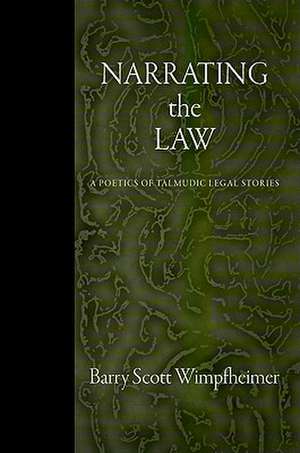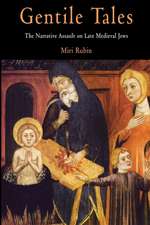Narrating the Law – A Poetics of Talmudic Legal Stories: Divinations: Rereading Late Ancient Religion
Autor Barry Scott Wimpfheimeren Limba Engleză Hardback – 28 feb 2011
Din seria Divinations: Rereading Late Ancient Religion
-
 Preț: 281.27 lei
Preț: 281.27 lei -
 Preț: 397.64 lei
Preț: 397.64 lei -
 Preț: 240.64 lei
Preț: 240.64 lei -
 Preț: 240.64 lei
Preț: 240.64 lei -
 Preț: 240.85 lei
Preț: 240.85 lei -
 Preț: 251.85 lei
Preț: 251.85 lei -
 Preț: 191.81 lei
Preț: 191.81 lei -
 Preț: 282.33 lei
Preț: 282.33 lei -
 Preț: 434.09 lei
Preț: 434.09 lei - 23%
 Preț: 538.19 lei
Preț: 538.19 lei -
 Preț: 334.91 lei
Preț: 334.91 lei -
 Preț: 468.04 lei
Preț: 468.04 lei -
 Preț: 192.86 lei
Preț: 192.86 lei -
 Preț: 282.16 lei
Preț: 282.16 lei -
 Preț: 304.49 lei
Preț: 304.49 lei - 11%
 Preț: 472.38 lei
Preț: 472.38 lei -
 Preț: 243.06 lei
Preț: 243.06 lei -
 Preț: 470.91 lei
Preț: 470.91 lei - 11%
 Preț: 507.99 lei
Preț: 507.99 lei -
 Preț: 431.87 lei
Preț: 431.87 lei - 11%
 Preț: 502.86 lei
Preț: 502.86 lei -
 Preț: 434.76 lei
Preț: 434.76 lei -
 Preț: 431.87 lei
Preț: 431.87 lei - 11%
 Preț: 468.94 lei
Preț: 468.94 lei - 11%
 Preț: 501.97 lei
Preț: 501.97 lei - 11%
 Preț: 469.96 lei
Preț: 469.96 lei - 11%
 Preț: 443.59 lei
Preț: 443.59 lei - 11%
 Preț: 613.62 lei
Preț: 613.62 lei - 11%
 Preț: 535.02 lei
Preț: 535.02 lei - 11%
 Preț: 448.73 lei
Preț: 448.73 lei - 11%
 Preț: 498.59 lei
Preț: 498.59 lei - 11%
 Preț: 450.46 lei
Preț: 450.46 lei -
 Preț: 465.14 lei
Preț: 465.14 lei - 11%
 Preț: 568.10 lei
Preț: 568.10 lei - 11%
 Preț: 470.68 lei
Preț: 470.68 lei - 11%
 Preț: 502.17 lei
Preț: 502.17 lei - 11%
 Preț: 504.56 lei
Preț: 504.56 lei - 11%
 Preț: 501.97 lei
Preț: 501.97 lei -
 Preț: 390.74 lei
Preț: 390.74 lei -
 Preț: 206.14 lei
Preț: 206.14 lei -
 Preț: 431.87 lei
Preț: 431.87 lei -
 Preț: 243.26 lei
Preț: 243.26 lei - 11%
 Preț: 473.24 lei
Preț: 473.24 lei - 11%
 Preț: 443.78 lei
Preț: 443.78 lei -
 Preț: 465.14 lei
Preț: 465.14 lei - 11%
 Preț: 500.29 lei
Preț: 500.29 lei -
 Preț: 460.35 lei
Preț: 460.35 lei - 11%
 Preț: 569.80 lei
Preț: 569.80 lei -
 Preț: 469.94 lei
Preț: 469.94 lei
Preț: 485.34 lei
Nou
Puncte Express: 728
Preț estimativ în valută:
92.87€ • 97.22$ • 76.84£
92.87€ • 97.22$ • 76.84£
Carte tipărită la comandă
Livrare economică 07-21 aprilie
Preluare comenzi: 021 569.72.76
Specificații
ISBN-13: 9780812242997
ISBN-10: 0812242998
Pagini: 248
Ilustrații: 1
Dimensiuni: 160 x 235 x 25 mm
Greutate: 0.98 kg
Editura: MT – University of Pennsylvania Press
Seria Divinations: Rereading Late Ancient Religion
ISBN-10: 0812242998
Pagini: 248
Ilustrații: 1
Dimensiuni: 160 x 235 x 25 mm
Greutate: 0.98 kg
Editura: MT – University of Pennsylvania Press
Seria Divinations: Rereading Late Ancient Religion
Recenzii
"Applying insights from literary criticism and sociology to the Talmud is no mean feat, but Wimpfheimer accomplishes this with elegance... This is one of the most significant contributions to Talmudic scholarship in recent years, and it has great relevance for anyone interested in the application of contemporary critical theory to ancient texts."-Jewish Book World "Well trained in the critical study of rabbinic literature and informed by previous philological scholarship as well as by critical theory, Wimpfheimer provides a model that has the potential to narrow the gap that has divided the two major vectors of rabbinic thinking, Halakhah and Aggadah, law and folklore. His exacting analysis of the literary genre of legal narrative puts this dichotomization into sharp relief."-Elliot R. Wolfson, New York University








